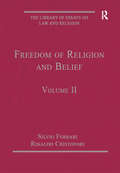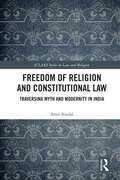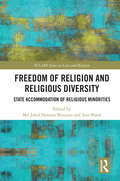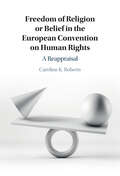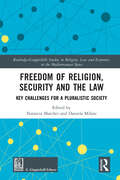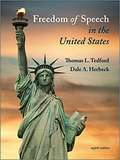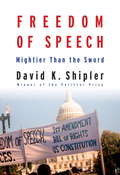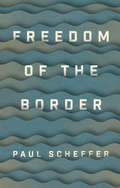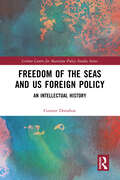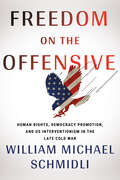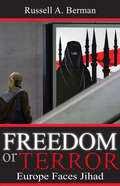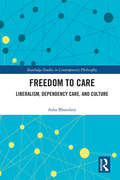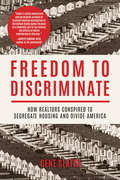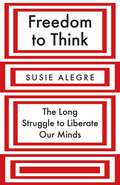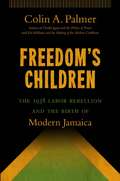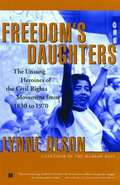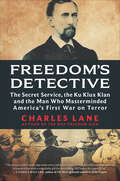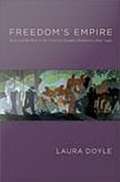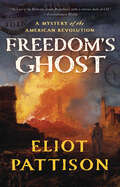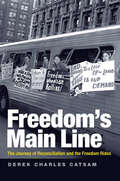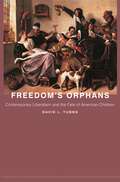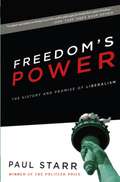- Table View
- List View
Freedom of Religion and Belief: Volume II (The Library of Essays on Law and Religion)
by Silvio Ferrari and Rinaldo CristoforiThe essays and articles selected for this volume analyze what is generally understood by freedom of religion and belief in today’s world. The different aspects of this fundamental right are considered from the contents of freedom of religion, to the possible limitations of this freedom; and from the freedom of, or freedom from, conundrum to the question of the collective or individual right. This volume reflects legal, philosophical and international perspectives, addresses numerous unanswered questions and offers an effective overview of the current literature and debate in this aspect of the discipline of law and religion.
Freedom of Religion and Constitutional Law: Traversing Myth and Modernity in India (ICLARS Series on Law and Religion)
by Amit BindalThis book investigates the intersection of religion and modern law. It explores how secular courts encounter the religious or mythical question which is disavowed by modern institutions. It questions the private-public dichotomy of liberal constitutionalism which relegates religion to the private sphere. It argues that in ex-colonial societies like India which are foundationally and diversely religious, the courts need to work through and engage with the difficulties and complexities posed by their continual encounter with the question of religion rather than re-affirming the myth of separation of law and myth, state and religion. This work demonstrates that any other approach leads to its repression and resultant reemergence in various forms. Such an approach of working through religious categories will be effective in the struggle against religious fanaticism that has seen a resurgence in contemporary times. The book will be a valuable resource for students and academics working in law, religious studies, history and political science.
Freedom of Religion and Religious Diversity: State Accommodation of Religious Minorities (ISSN)
by Md Jahid Hossain Bhuiyan Ann BlackToday, pluralism is increasingly the norm and can be seen as a permanent characteristic of modernity. As seen in world events, religion has not become irrelevant but more diverse, giving rise to a complex web of religion and belief minorities, together with intra-plural majorities. Nations seek ways to implement the ideal of freedom of religion, but as this book shows, whether East or West, in the global North or the South, there is no simple formalism for accommodating religious diversity. Different faith communities have competing needs and demands for the same social space, with tensions inevitably arising. This book highlights responses from liberal democracies which enshrine secularism into their constitutions to other constitutions where religion and ethnic identity are enshrined to prioritise their ethno-religious majority. Western and Asian countries encounter different obstacles and challenges. With analysis from 19 international scholars, the book explores different obstacles and responses to accommodation of religious minorities in a range of jurisdictions. In a globalised world, it will be invaluable for comparative legal scholars, for law and religion scholars, researchers and students, and decision-makers, e.g., governments, non-governmental organisations, and for those who seek to better understand the challenges of our time.
Freedom of Religion and the Secular State
by Russell BlackfordExploring the relationship between religion and the state Focusing on the intersection of religion, law, and politics in contemporary liberal democracies, Blackford considers the concept of the secular state, revising and updating enlightenment views for the present day. Freedom of Religion and the Secular State offers a comprehensive analysis, with a global focus, of the subject of religious freedom from a legal as well as historical and philosophical viewpoint. It makes an original contribution to current debates about freedom of religion, and addresses a whole range of hot-button issues that involve the relationship between religion and the state, including the teaching of evolution in schools, what to do about the burqa, and so on.
Freedom of Religion or Belief in the European Convention on Human Rights: A Reappraisal
by Caroline K. RobertsThe right to freedom of thought, conscience and religion in Article 9 of the European Convention on Human Rights (ECHR) has become increasingly significant and contested. Through an examination of ECHR Article 9, its drafting history, and the related jurisprudence of the European Court of Human Rights (ECtHR), Caroline K. Roberts challenges the classic approach to this right in the literature. Roberts argues that claims that there is, or should be, a clear binary and hierarchical distinction between the absolutely protected internal realm and the qualified external realm in this right are not founded textually or jurisprudentially. Rather, the primary materials suggest that the internal and external aspects are deeply interrelated, and this is reflected in the ECtHR's nuanced and holistic approach to ECHR Article 9 protection. This comprehensive, rigorous and up-to-date reappraisal of ECHR Article 9 and the related ECtHR jurisprudence will be essential reading for academics and practitioners.
Freedom of Religion, Security and the Law: Key Challenges for a Pluralistic Society (Routledge-Giappichelli Studies in Religion, Law and Economics in the Mediterranean Space)
by Natascia Marchei Daniela MilaniThis collection addresses many of the issues arising from the management of religious and cultural diversity in a multicultural society and refers to the complex relationship between the right to religious freedom and security. In recent decades, and particularly since September 2001, the right to religious freedom, which has hitherto been widely protected, has come up against a significant challenge in terms of security, or rather, in the subjectively and publicly perceived feelings of security. This book collects original theoretical, legal and comparative contributions addressing several implications for the right to freedom of religion or belief through the lens of security. It offers a new key to understanding how to manage the processes of integration of religious diversity in multifaith societies. Written by leading experts in the area, the work reveals the importance of avoiding simplistic conclusions and unfounded prejudices about religious freedom, and of limiting restrictive or repressive interventions to situations of genuine danger. The book will be an essential resource for researchers, academics and policy-makers working in the areas of Law and Religion, Human Rights Law and Security Studies.
Freedom of Speech and Information in Global Perspective
by Pekka Hallberg Janne VirkkunenThis book offers a unique exploration of the current state of freedom of speech as a basic right available to everyone. The research focuses on the different development stages of the concept of freedom of speech and the use of modern indicators to depict the its treatment in different legal cultures, including the obligations under international treaties and the effects that the globalising and digitalising environment have had on it. The authors conduct a broad survey of freedom of speech around the world, from Europe over Russia and both Americas to Africa, Asia, and Australia. The aim of this survey is to identify safeguards of freedom of speech on both a national and an international level, violations and threat scenarios, and in particular challenges to freedom of speech in the digital era.
Freedom of Speech in the United States
by Thomas L. Tedford Dale A. HerbeckFreedom of Speech in the United States provides students who have minimal legal background with a readable historical survey and an up-to-date analysis of free speech issues and cases in the United States. This information is presented in an organized manner to explain specialized terms so that the student, with the help of the book's case summaries and glossary, can follow the historical figures and fascinating stories that are such an important part of the study of freedom of expression. The eighth edition has been updated to reflect the latest free speech decisions of the U.S. Supreme Court, as well as ongoing controversies such as Wikileaks and the release of government documents, the liability of Internet Service Providers for user behavior, file hosting services that can be used to share copyrighted material, Net neutrality, libel tourism, and the implications to U.S. citizens of European laws concerning the right to be left alone. The text is intended for college and university courses that focus on the free speech clause of the First Amendment.
Freedom of Speech: Mightier Than the Sword
by David K. ShiplerA provocative, timely assessment of the state of free speech in America With his best seller The Working Poor, Pulitzer Prize winner and former New York Times veteran David K. Shipler cemented his place among our most trenchant social commentators. Now he turns his incisive reporting to a critical American ideal: freedom of speech. Anchored in personal stories--sometimes shocking, sometimes absurd, sometimes dishearteningly familiar--Shipler's investigations of the cultural limits on both expression and the willingness to listen build to expose troubling instabilities in the very foundations of our democracy. Focusing on recent free speech controversies across the nation, Shipler maps a rapidly shifting topography of political and cultural norms: parents in Michigan rallying to teachers vilified for their reading lists; conservative ministers risking their churches' tax-exempt status to preach politics from the pulpit; national security reporters using techniques more common in dictatorships to avoid leak prosecution; a Washington, D.C., Jewish theater's struggle for creative control in the face of protests targeting productions critical of Israel; history teachers in Texas quietly bypassing a reactionary curriculum to give students access to unapproved perspectives; the mixed blessings of the Internet as a forum for dialogue about race. These and other stories coalesce to reveal the systemic patterns of both suppression and opportunity that are making today a transitional moment for the future of one of our founding principles. Measured yet sweeping, Freedom of Speech brilliantly reveals the triumphs and challenges of defining and protecting the boundaries of free expression in modern America.From the Hardcover edition.
Freedom of the Border
by Paul SchefferThere are few issues more contentious today than the nature and purpose of borders. Migration flows and the refugee crisis have propelled the issue of borders into the centre of political debate and revealed our moral unease more clearly than ever. Who are we to deny others access to our territory? Is not freedom of movement a basic human right, one that should be defended above all others? In this book Paul Scheffer takes a different view. Rather than thinking of borders as obstacles to freedom, he argues that borders make freedom possible. Democracy and redistributive justice are only possible with the regulation of access to territories and rights. When liberals ignore an open society’s need for borders, people with authoritarian inclinations will begin to erect them. In the context of Europe, the project of removing internal borders can therefore only be successful if Europe accepts responsibility for its external border. This timely and important book challenges conventional ways of thinking and will be of interest to everyone concerned with the great social and political issues of our time.
Freedom of the Seas and US Foreign Policy: An Intellectual History (Corbett Centre for Maritime Policy Studies Series)
by Connor DonahueThis book critically analyzes US political-military strategy by arguing that freedom of the seas discourse is fundamentally unfit for an era of maritime great power competition.The work conducts a genealogical intellectual history of freedom of the seas discourse in US foreign policy to show how the concept has evolved over time to facilitate American control over the global ocean space. It concludes that the contemporary discourse works to establish the high seas as an arena free from claims of sovereignty so that the United States, as the presumed unrivaled naval power, can intervene globally on behalf of its national interests. However, since sea control strategies depend on a preponderance of material force, as the United States wanes in relative material capability it becomes less able to support political-military strategies predicated on the assumption of global naval dominance. The book provides a timely commentary on the current geopolitical competition between the United States and China, and critiques the US approach toward China in the maritime domain in order to highlight potential avenues of foreign policy action that may enable the two countries to mitigate the risk of conflict.This book will be of much interest to students of naval history, maritime security, US foreign policy, and international relations.
Freedom on the Offensive: Human Rights, Democracy Promotion, and US Interventionism in the Late Cold War (The United States in the World)
by William Michael SchmidliIn Freedom on the Offensive, William Michael Schmidli illuminates how the Reagan administration's embrace of democracy promotion was a defining development in US foreign relations in the late twentieth century. Reagan used democracy promotion to refashion the bipartisan Cold War consensus that had collapsed in the late 1960s amid opposition to the Vietnam War. Over the course of the 1980s, the initiative led to a greater institutionalization of human rights—narrowly defined to include political rights and civil liberties and to exclude social and economic rights—as a US foreign policy priority. Democracy promotion thus served to legitimize a distinctive form of US interventionism and to underpin the Reagan administration's aggressive Cold War foreign policies. Drawing on newly available archival materials, and featuring a range of perspectives from top-level policymakers and politicians to grassroots activists and militants, this study makes a defining contribution to our understanding of human rights ideas and the projection of American power during the final decade of the Cold War. Using Reagan's undeclared war on Nicaragua as a case study in US interventionism, Freedom on the Offensive explores how democracy promotion emerged as the centerpiece of an increasingly robust US human rights agenda. Yet, this initiative also became intertwined with deeply undemocratic practices that misled the American people, violated US law, and contributed to immense human and material destruction. Pursued through civil society or low-cost military interventions and rooted in the neoliberal imperatives of US-led globalization, Reagan's democracy promotion initiative had major implications for post–Cold War US foreign policy.
Freedom or Terror: Europe Faces Jihad
by Russell A. BermanIn his analysis of Europe's ambivalence toward jihadist terror and the spread of aggressive Islamism, with particular emphasis on the European responses—or lack thereof—to this violent anti-modernism, Russell A. Berman describes how some European countries opt for appeasement and apologetics, whereas others muster the strength to defend their way of life and stand up for freedom. He describes a complex continent of different nations and traditions to further our understanding of the range of reactions to Islamism.
Freedom to Care: Liberalism, Dependency Care, and Culture (Routledge Studies in Contemporary Philosophy)
by Asha BhandaryThis book presents the first systematic account of dependency care in a liberal theory of justice. Despite the fact that receiving dependency care is necessary for human survival, the practices with which we meet society’s care needs are seldom recognized for their functional role. Instead, norms about gender and race obscure and shape expectations about whose needs for care are legitimate as well as about whose caregiving labor more advantaged members of society will receive. These opaque arrangements must be made visible if we are to remedy skewed intuitions and judgements about care. Freedom to Care develops a modified form of social contract theory with which to evaluate society’s caregiving arrangements. Building on work by feminist liberals and care ethicists, it reframes debates about care to move beyond gender with an inequality-tracking framework that can be employed in any culture. Because care provision has been enmeshed in the subordination of women and people of color, eliminating the invisibility of these forms of labor yields a critical liberal theory of justice with feminist and anti-racist aims.
Freedom to Discriminate: How Realtors Conspired to Segregate Housing and Divide America
by Gene SlaterA landmark history told with supreme narrative skill, Freedom to Discriminate uncovers realtors’ definitive role in segregating America and shaping modern conservative thought. Gene Slater follows this story from inside the realtor profession, drawing on many industry documents that have remained unexamined until now. His book traces the increasingly aggressive ways realtors justified their practices, how they successfully weaponized the word &“freedom&” for their cause, and how conservative politicians have drawn directly from realtors’ rhetoric for the past several decades. Much of this story takes place in California, and Slater demonstrates why one of the very first all-white neighborhoods was in Berkeley, and why the state was the perfect place for Ronald Reagan’s political ascension. The hinge point in this history is Proposition 14, a largely forgotten but monumentally important 1964 ballot initiative. Created and promoted by California realtors, the proposition sought to uphold housing discrimination permanently in the state’s constitution, and a vast majority of Californians voted for it. This vote had explosive consequences—ones that still inform our deepest political divisions today—and a true reckoning with the history of American racism requires a closer look at the events leading up to it. Freedom to Discriminate shatters preconceptions about American segregation, and it connects many seemingly disparate aspects of the nation’s history in a novel and galvanizing way.
Freedom to Think: The Long Struggle to Liberate Our Minds
by Susie AlegreWithout a moment's pause, we share our most intimate thoughts with trillion-dollar tech companies. Their algorithms categorize us and jump to conclusions about who we are. They even shape our everyday thoughts and actions - from who we date to how we vote. But this is just the latest front in an age-old struggle.Part history and part manifesto, Freedom to Think charts the history and importance of our most basic human right: freedom of thought. From Galileo to Nudge Theory to Alexa, human rights lawyer Susie Alegre explores how the powerful have always sought to get inside our heads, influence how we think and shape what we buy. Providing a bold new framework to understand how our agency is being gradually undermined, Freedom to Think is a ground-breaking and vital charter for taking back our humanity and safeguarding our reason.
Freedom's Children
by Colin A. PalmerFreedom's Children is the first comprehensive history of Jamaica's watershed 1938 labor rebellion and its aftermath. Colin Palmer argues that, a hundred years after the abolition of slavery, Jamaica's disgruntled workers challenged the oppressive status quo and forced a morally ossified British colonial society to recognize their grievances. The rebellion produced two rival leaders who dominated the political life of the colony through the achievement of independence in 1962. Alexander Bustamante, a moneylender, founded the Bustamante Industrial Trade Union and its progeny, the Jamaica Labour Party. Norman Manley, an eminent barrister, led the struggle for self-government and with others established the People's National Party. Palmer describes the ugly underside of British colonialism and details the persecution of Jamaican nationalists. He sheds new light on the nature of Bustamante's collaboration with the imperial regime, the rise of the trade-union movement, the struggle for constitutional change, and the emergence of party politics in a modernizing Jamaica.
Freedom's Daughters: The Unsung Heroines of the Civil Rights Movement from 1830 to 1970
by Lynne OlsonHistory of the role of women in the Civil Rights movement.
Freedom's Detective: The Secret Service, the Ku Klux Klan and the Man Who Masterminded America's First War on Terror
by Charles Lane“A riveting narrative history about early attempts to crack down and even stamp out the Ku Klux Klan’s reign of domestic terrorism . . . magnificent.” —Douglas Brinkley, New York Times–bestselling author of American MoonshotIn the years following the Civil War, a new battle began. Newly freed African American men had gained their voting rights and would soon have a chance to transform Southern politics. Former Confederates and other white supremacists mobilized to stop them. Thus, the KKK was born.After the first political assassination carried out by the Klan, Washington power brokers looked for help in breaking the growing movement. They found it in Hiram C. Whitley. He became head of the Secret Service, which had previously focused on catching counterfeiters and was at the time the government’s only intelligence organization. Whitley and his agents led the covert war against the nascent KKK and were the first to use undercover work in mass crime—what we now call terrorism—investigations. Like many spymasters, Whitley also had a dark side. His penchant for skulduggery and dirty tricks ultimately led to his involvement in a conspiracy that would end his career and transform the Secret Service.Populated by intriguing historical characters—from President Grant to brave Southerners, both black and white, who stood up to the Klan—Freedom’s Detective reveals the untold story of this complex, controversial hero and his central role in a long-lost chapter of American history.“A powerful, vitally important story . . . Lane brings it to life with not only vast amounts of research but with a remarkable gift for storytelling . . . the pages fly by.” —Candice Millard, New York Times–bestselling author of The River of Doubt“Lane’s account of Whitley’s infiltration of the Klan is endlessly gripping.” —NPR“American history buffs won’t want to miss this one.” —Publishers Weekly (starred review)
Freedom's Empire: Race and the Rise of the Novel in Atlantic Modernity, 1640-1940
by Laura DoyleIn this pathbreaking work of scholarship, Laura Doyle reveals the central, formative role of race in the development of a transnational, English-language literature over three centuries. Identifying a recurring freedom plot organized around an Atlantic Ocean crossing, Doyle shows how this plot structures the texts of both African-Atlantic and Anglo-Atlantic writers and how it takes shape by way of submerged intertextual exchanges between the two traditions. For Anglo-Atlantic writers, Doyle locates the origins of this narrative in the seventeenth century. She argues that members of Parliament, religious refugees, and new Atlantic merchants together generated a racial rhetoric by which the English fashioned themselves as a "native," "freedom-loving," "Anglo-Saxon" people struggling against a tyrannical foreign king. Stories of a near ruinous yet triumphant Atlantic passage to freedom came to provide the narrative expression of this heroic Anglo-Saxon identity--in novels, memoirs, pamphlets, and national histories. At the same time, as Doyle traces through figures such as Friday in Robinson Crusoe, and through gothic and seduction narratives of ruin and captivity, these texts covertly register, distort, or appropriate the black Atlantic experience. African-Atlantic authors seize back the freedom plot, placing their agency at the origin of both their own and whites' survival on the Atlantic. They also shrewdly expose the ways that their narratives have been "framed" by the Anglo-Atlantic tradition, even though their labor has provided the enabling condition for that tradition. Doyle brings together authors often separated by nation, race, and period, including Aphra Behn, Eliza Haywood, Olaudah Equiano, Nathaniel Hawthorne, Harriet Wilson, Pauline Hopkins, George Eliot, and Nella Larsen. In so doing, she reassesses the strategies of early women novelists, reinterprets the significance of rape and incest in the novel, and measures the power of race in the modern English-language imagination.
Freedom's Ghost: A Mystery of the American Revolution (Bone Rattler #7)
by Eliot PattisonAs the drumbeat of the American Revolution grows ever closer, Scotsman-turned-American-patriot Duncan McCallum must navigate treacherous cultural and political waters if he&’s to secure a fighting chance for the fledgling nation in this gripping installment of the acclaimed Bone Rattler seriesAfter narrowly avoiding death in London at the hands of the king&’s secret agents, Duncan McCallum returns to colonial America only to discover that his troubles have followed him across the Atlantic.The harbor town of Marblehead, Massachusetts, is a smoldering powder keg as British loyalists and advocates for liberty feverishly maneuver to determine the future of the colonies. When a Native American sailor is scapegoated for the gruesome murders of officers of the British occupation troops, McCallum will have to face off against ruthless adversaries close to the crown. Soliciting the assistance of such notable historical figures as John Hancock, Crispus Attucks, and John and Samuel Adams, McCallum must rely on his skills in science, subterfuge, and diplomacy to stave off a war for which America is not yet prepared.Just as Patrick O&’Brian&’s Master and Commander series took readers on a thrilling journey through the Napoleonic Wars, Freedom&’s Ghost and the Bone Rattler series offer riveting historical adventures embedding readers in the clashes and intrigue of the American Revolution.
Freedom's Main Line: The Journey of Reconciliation and the Freedom Rides (Civil Rights And The Struggle For Black Equality In The Twentieth Century Ser.)
by Derek Charles Catsam“A compelling, spellbinding examination of a pivotal event in civil rights history . . . a highly readable and dramatic account of a major turning point.” —Journal of African-American HistoryBlack Americans in the Jim Crow South could not escape the grim reality of racial segregation, whether enforced by law or by custom. In Freedom’s Main Line: The Journey of Reconciliation and the Freedom Rides, author Derek Charles Catsam shows that courtrooms, classrooms, and cemeteries were not the only front lines in African Americans’ prolonged struggle for basic civil rights. Buses, trains, and other modes of public transportation provided the perfect means for civil rights activists to protest the second-class citizenship of African Americans, bringing the reality of the violence of segregation into the consciousness of America and the world. Freedom’s Main Line argues that the Freedom Rides, a turning point in the Civil Rights Movement, were a logical, natural evolution of such earlier efforts as the Journey of Reconciliation, relying on the principles of nonviolence so common in the larger movement. The impact of the Freedom Rides, however, was unprecedented, fixing the issue of civil rights in the national consciousness. Later activists were often dubbed Freedom Riders even if they never set foot on a bus. With challenges to segregated transportation as his point of departure, Catsam chronicles black Americans’ long journey toward increased civil rights. Freedom’s Main Line tells the story of bold incursions into the heart of institutional discrimination, journeys undertaken by heroic individuals who forced racial injustice into the national and international spotlight and helped pave the way for the landmark Civil Rights Act of 1964.
Freedom's Mirror
by Ada FerrerDuring the Haitian Revolution of 1791-1804, arguably the most radical revolution of the modern world, slaves and former slaves succeeded in ending slavery and establishing an independent state. Yet on the Spanish island of Cuba barely fifty miles distant, the events in Haiti helped usher in the antithesis of revolutionary emancipation. When Cuban planters and authorities saw the devastation of the neighboring colony, they rushed to fill the void left in the world market for sugar, to buttress the institutions of slavery and colonial rule, and to prevent "another Haiti" from happening in their own territory. Freedom's Mirror follows the reverberations of the Haitian Revolution in Cuba, where the violent entrenchment of slavery occurred at the very moment that the Haitian Revolution provided a powerful and proximate example of slaves destroying slavery. By creatively linking two stories - the story of the Haitian Revolution and that of the rise of Cuban slave society - that are usually told separately, Ada Ferrer sheds fresh light on both of these crucial moments in Caribbean and Atlantic history.
Freedom's Orphans: Contemporary Liberalism and the Fate of American Children (New Forum Books #42)
by David L. TubbsHas contemporary liberalism's devotion to individual liberty come at the expense of our society's obligations to children? Divorce is now easy to obtain, and access to everything from violent movies to sexually explicit material is zealously protected as freedom of speech. But what of the effects on the young, with their special needs and vulnerabilities? Freedom's Orphans seeks a way out of this predicament. Poised to ignite fierce debate within and beyond academia, it documents the increasing indifference of liberal theorists and jurists to what were long deemed core elements of children's welfare. Evaluating large changes in liberal political theory and jurisprudence, particularly American liberalism after the Second World War, David Tubbs argues that the expansion of rights for adults has come at a high and generally unnoticed cost. In championing new "lifestyle" freedoms, liberal theorists and jurists have ignored, forgotten, or discounted the competing interests of children. To substantiate his arguments, Tubbs reviews important currents of liberal thought, including the ideas of Isaiah Berlin, Ronald Dworkin, and Susan Moller Okin. He also analyzes three key developments in American civil liberties: the emergence of the "right to privacy" in sexual and reproductive matters; the abandonment of the traditional standard for obscenity prosecutions; and the gradual acceptance of the doctrine of "strict separation" between religion and public life.
Freedom's Power: The History and Promise of Liberalism
by Paul StarrAmerican politics are as fractured and partisan as they have ever been and liberalism is in greater peril than at any time in recent history. Conservatives treat it as an epithet, and even some liberals have confused it with sentimentality and socialism. But Paul Starr, Pulitzer Prize-winning author and one of America’s leading intellectuals, claims that, properly understood, liberalism is a sturdy public philosophy, deeply rooted in our traditions, capable of making America a freer and more secure country.
